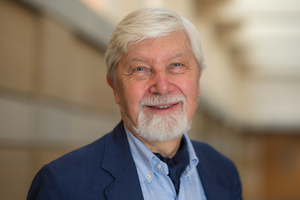 Peter Wallensteen
Peter Wallensteen
The 2019 Nobel Peace Prize was awarded to Ethiopian Prime Minister Abiy Ahmed Ali for his work at international collaboration and building peace, specifically in his efforts to resume peace talks and address a border conflict with Eritrea. "The Norwegian Nobel Committee hopes that the Nobel Peace Prize will strengthen Prime Minister Abiy in his important work for peace and reconciliation. Ethiopia is Africa’s second most populous country and has East Africa’s largest economy. A peaceful, stable and successful Ethiopia will have many positive side-effects, and will help to strengthen fraternity among nations and peoples in the region," said the press release announcing Prime Minister Abiy Ahmed's selection.
Peter Wallensteen, the Richard G. Starmann Sr. Research Professor Emeritus of Peace Studies at the University of Notre Dame’s Kroc Institute for International Peace Studies and Senior Professor in the Department of Peace and Conflict Research at Sweden’s Uppsala University, notes that this prize rewards "unique political accomplishments." He offers comments on this year's award below:
Prime Minister Abiy Ahmed became Ethiopia’s leader only a year and half ago in April 2018. He has not only found a way to bring the protracted conflict with neighboring Eritrea to a form of closure, but his activities have also changed the political dynamics of the region and contributed to the democratization of Ethiopia.
These are surprising, brave actions and they have resulted in tangible effects: peace agreements, freeing of political prisoners, a more open debate and promises of free elections by 2020.
Prime Minister Abiy Ahmed is among Africa’s younger leaders and has his Ph.D. in peace studies from the University of Addis Ababa. It seems that he really is applying some of the insights from peace research!
The war between Ethiopia and Eritrea from 1998 to 2000 belongs among the most devastating, and often underestimated, conflicts in Africa. It ended with a mediated peace agreement in 2000 and the border conflict was solved through international arbitration in 2002. However, Ethiopia refused to implement the outcome until Prime Minister Abiy Ahmed took office and entered into a new peace agreement with Eritrea.
There may still be unsolved issues, but the relaxation of tension is evident. Prime Minister Abiy Ahmed has also been engaged as a peacebuilder within the region as a whole, notably in South Sudan, Sudan and Somalia. Much of this work has been within the framework of the regional organization for the Horn of Africa, the Intergovernmental Authority on Development (IGAD).
The democratic reforms in Ethiopia have opened space for healthy political action and debate. It has also resulted in local revolts and violence. There are groups opposing Prime Minister Abiy Ahmed’s approach, but the Peace Prize may help to strengthen his position when facing such challenges.
Media contact: Peter Wallensteen, Peter.N.Wallensteen.4@nd.edu
Colleen Sharkey, Assistant Director of Media Relations, csharke2@nd.edu